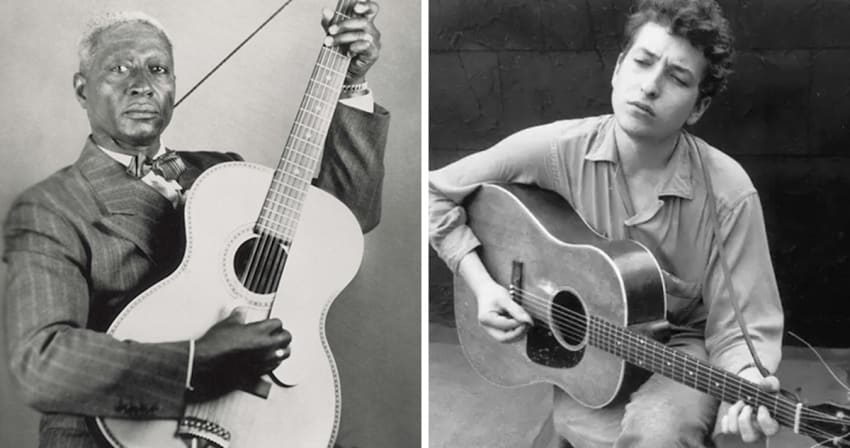The Lead Belly Song That Changed Bob Dylan’s Life
“And that record changed my life right then and there.” – Bob Dylan
By Andy Kahn Dec 6, 2023 • 2:04 pm PST

In 1954, British musician Lonnie Donegan released a single featuring his recording of the song “Rock Island Line.” The first known recording of “Rock Island Line” was in 1934 when John Lomax recorded a group of Black prison inmates in Arkansas.
Singer-songwriter Huddie “Lead Belly” Ledbetter, a 12-string guitarist from Louisiana who accompanied Lomax to the prison in order to record the traditional Black songs sung by the inmates, soon recorded his own version of “Rock Island Line.” Released several years after that, Donegan’s version of “Rock Island Line” was a faster-tempo attempt at Lead Belly’s arrangement of the song, with some alterations likely due in part to Donegan’s misinterpreting Lead Belly’s lyrics.
Advertisement
Donegan’s single helped ignite the skiffle craze in Britain. Skiffle was a highly influential precursor to the rock ‘n’ roll scene in the United Kingdom, and Donegan became one of the central figures of the genre that blended American folk, blues and New Orleans jazz music. Donegan and the skiffle scene influenced many future British rock ‘n’ roll legends like members of The Rolling Stones, Led Zeppelin, The Who, Pink Floyd and many others, including The Beatles.
“If there was no Lead Belly, there would have been no Lonnie Donegan,” The Beatles guitarist George Harrison purportedly said. “No Lonnie Donegan, no Beatles. Therefore no Lead Belly, no Beatles.”
Lead Belly’s influence on folk and rock music was not limited to musicians in the U.K. Many of Lead Belly’s arrangements of traditional songs were staples of the 1960s folk revival as he helped popularize “Midnight Special,” “In The Pines” (“Where Did You Sleep Last Night?”), “Black Betty,” “Alberta” and “Boll Weevil,” as well as his signature, “Goodnight, Irene.”
Another influential song credited to Lead Belly is his composition “Cotton Fields,” which is believed to have been first recorded in 1940. Much like Lonnie Donegan’s recording of Lead Belly’s “Rock Island Line” helped pave the way for The Beatles, Lead Belly’s song “Cotton Fields” had a lasting impact on another musician whose influence is equally immeasurable.
Bob Dylan spoke about hearing Lead Belly’s recording of “Cotton Fields” during his 2016 Nobel Lecture after receiving the Nobel Prize for Literature. After detailing the influence of Buddy Holly, Dylan relayed a story about hearing Lead Belly for the first time shortly after Holly’s tragic death in a plane crash, with fellow rock pioneers Richie Valens and the Big Bopper, “the day the music died” on February 3, 1959.
Advertisement
In his Nobel speech, Dylan stated:
“I think it was a day or two after that that his plane went down. And somebody – somebody I’d never seen before – handed me a Leadbelly record with the song “Cotton Fields” on it. And that record changed my life right then and there. Transported me into a world I’d never known. It was like an explosion went off. Like I’d been walking in darkness and all of the sudden the darkness was illuminated. It was like somebody laid hands on me. I must have played that record a hundred times.”
“Cotton Fields” was recorded by folk singer Odetta for her 1954 album with Lawrence Mohr, Odetta & Larry. The song was later covered by The Beach Boys, Johnny Cash, Credence Clearwater Revival and many others. Led Zeppelin guitarist Jimmy Page performed the song with a skiffle band during a 1957 appearance on the British television program All Your Own.
“I appeared on the BBC’s All Your Own program hosted by Huw Wheldon,” Page recalled. “It was a show that showcased kids with talent or unusual hobbies and at that time I probably fell into the second category. It was a skiffle group, an infectious form of music that was played on the radio, and TV at that time. Being accessible for kids to be able to play with a minimum of chords. The source for most of this music came from the USA: Woody Guthrie, Lead Belly, country blues etc. The shining light and inspiration to many aspiring skifflers was Lonnie Donegan.”
Bob Dylan has never recorded or performed “Cotton Fields” (he has performed “In The Pines” live a handful of times), but named Lead Belly in the song “Song To Woody” about folk singer Woody Guthrie from Dylan’s 1962 self-titled album.
“Here’s to Cisco an’ Sonny an’ Lead Belly too,” Dylan sang, calling out Cisco Houston and Sonny Terry alongside their folk music peer.
Unfortunately, Dylan’s homage to Lead Belly was a posthumous tribute, coming several years after his death on this date 1949, when he was believed to be age 61. Given his influence on such influential rock ‘n’ roll artists as The Beatles and Bob Dylan, Lead Belly was inducted into the Rock And Roll Hall Of Fame in 1988.
Listen to the song that changed Bob Dylan’s life, Lead Belly’s “Cotton Fields,” and hear Dylan’s Nobel Laurate Lecture lauding the late singer-songwriter below:
Advertisement
Loading tour dates
